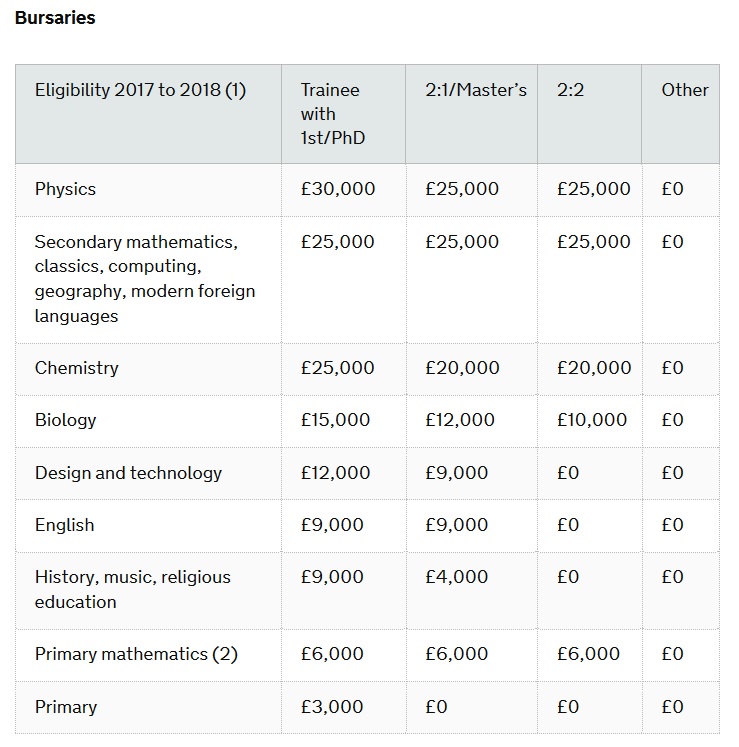Physics and maths graduates training to be teachers under the School Direct salaried route next year could get less cash after the government cut funding for schools.
Initial teacher training funding figures published today show that schools offering School Direct places for the shortage subjects of maths and physics will get up to £6,000 less government funding.
It means the salaries they can offer trainees are likely to take a hit.
School Direct salaried funding for the two subjects in schools outside of London will fall from £25,000 this year to £19,000 from 2017.
For schools in inner London, the funding will fall from £29,900 to £23,900.
The government said last year that schools could only attain the higher funding rates if it upped salaries for maths and physics trainees to at least £21,000 nationally, but the extra cash does not seem available from next year.
The government has also ditched incentives of up to £9,000 for graduates with a third-class degree in subjects such as physics and secondary maths. Bursaries in biology will also fall by £5,000 to £15,000.
Trainee primary teachers from next year will only be able to claim a £3,000 bursary if they achieve a first, compared to those with a 2.1 degree this year.
But it’s not all bad news. 
A £25,000 bursary specifically for classics graduates will be introduced from next year. Previously classics graduates had to apply under either languages or history.
The government is also upping the amount it offers geography trainees by £10,000 to £25,000.
Cash for scholarships is also due to rise, with secondary maths, computing and chemistry graduates all able to claim £27,000 – up from £2,500 last year.
Those in geography and modern foreign languages can also claim £27,500 – it appears scholarships in these subjects were not available last year.
Schools Week reported analysis released in March that claimed the government needed to find 3,500 more language teachers to meet its EBacc demand.
Scholarships are only available for graduates with a 2.1 or above – however those with 2.2 degrees may be awarded a place in “exceptional circumstances”.
When bumping up bursaries last year, schools minister Nick Gibb said: “To ensure we can continue to attract the best and brightest graduates into the profession, with the potential to be excellent teachers in these key subjects, we are continuing to offer a wide range of bursaries and scholarships.
“These new financial incentives will give more talented people the opportunity to become teachers so they can inspire even more young people to achieve their full potential.”
But the government has come under fire for spending almost £1 billion on bursaries for new teachers – without having properly evaluated their effectiveness.
In February, the National Audit Office’s training new teachers report warned the department was not doing enough to train new teachers after vacancy numbers almost increased ten-fold between 2010 and 2014.








That table shows everything that is wrong with this system. Giving equality to PhD and 1st class honours undergraduate degee is simply stupid. Likewise, masters and 2:1. Like it or not, there is a huge variation in “quality” in the same subject across different universities. We employ graduates in the design and engineering sector. In general terms, first class honours from some universities are equivalent to 2:2 or 3rd class honours at others. But ultimately it comes down to the individual student and all this system does is penalise those who didn’t play the system that well.
Postgaduate qualifications demonstrate that the student can undertake extended project or research based study. Most first degrees (in STEM) focus on acquiring skills in increasingly focussed subject areas so students focussed on gaining better degree marks can achieve this through careful selection of subjects in final years. As employers, this is what we look at. What they actually did, not what mark they got. Ultimately we employ the person, not the grade, and apply salary levels based on the capability of the person to do the job.
But looking at that list again, given all the recent commentary about D&T teacher shortages, why is this not top of the list or up there? Makes no sense.
Bottom line is that money should be distributed based on proven ability to do the job, not on anticipated performance based on degree grades. Who cares if you graduate with a 2:2 when you have proven you can inspire a class of kids?